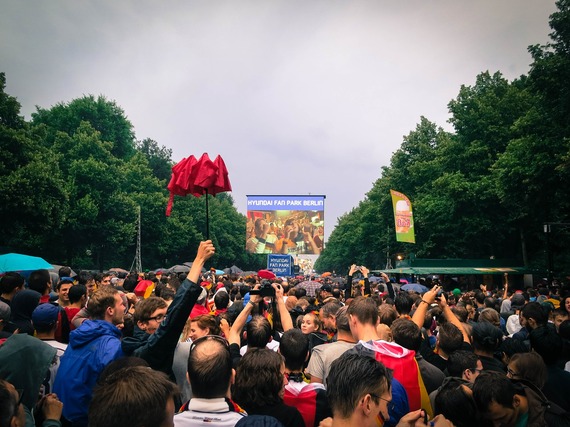Image: Soccer fans. Stock Photo. Pixabay.com
Soccer fans around the world were outraged when an official of Russia's football federation praised Russian thugs who attacked English fans in the stands where Russia and England had fought to a 1-1 tie in the European Championships.
But the fact is that some soccer kingpins in the former Soviet Union either condone their fans' violence, shift the blame to rival fans provoking "our guys," or engage in violent behavior themselves.
Immediately after the match between Russia and England ended on June 11 in Marseilles, France, dozens of Russian toughs in the stadium charged a section with English fans. Many were carrying clubs and other weapons.
At least 20 English supporters were injured, some seriously. A handful were hospitalized.
The governing body of European football, UEFA, condemned the attacks, and warned Russia that if there were a repeat, the Russian team would be tossed out of the competition.
But Igor Lebedev, a Russian parliamentarian who sits on the executive committee of the country's football federation, praised the thugs involved in the Marseille attack as defending their country's honor.
"I don't see anything wrong with the fans fighting," he tweeted. "Quite the opposite. Well done, guys -- keep it up!"
"I don't understand those politicians and officials who are criticizing our fans," Lebedev, a member of the nationalist Liberal Democratic Party of Russia, said in another tweet. "We should defend them."
Russia's sports minister, Vitaly Mutko, sloughed off the violence as well to start with, saying it had been exaggerated. When that initial cop-out provoked further outrage, he began decrying the attacks.
Mutko, who has desperately been trying to prevent the International Olympic Committee from barring Russia's track and field team from August's Rio Olympics for state-sponsored doping, can ill afford another big-sports fiasco on his watch.
The Russian fan violence in Marseilles has already generated calls for international soccer's governing body to strip Russia of the 2018 World Championships.
Lebedev didn't help Mutko's cause by saying that if Mutko had been a fan instead of a sports official, he probably would have been in the stands fighting with the Russians, too.
Although that characterization was a public-relations ping for Mutko, it probably was on the mark.
Video footage showed him on the field after the match appearing to egg on the Russian fans.
Ukraine is another former Soviet country where soccer officials have condoned fan violence.
After Dynamo Kiev fans beat up black fans -- and whites who tried to protect the blacks -- at a match between Kiev and Chelsea on November 4 of 2015, Dynamo Vice President Alexei Semenenko played the provocation card.
He contended that Dynamo haters purposely brought black fans to the match to provoke racial attacks as a way of smearing the Kiev club. Say what?
It's one thing for a soccer official to condone his team's fan violence or to try to blame it on provocation from the opposing side, but it's quite another for an official to tarnish the sport by engaging in violence himself.
Ruben Hayrapetian, an oligarch who heads the Football Federation of Armenia, has pricked the country's soccer image abroad by being party to two savage, well-publicized off-the-field beatings.
The worst was in 2012, when six of his bodyguards got into a confrontation with army medics who were eating at a restaurant the Hayrapetian family owns.
One of the medics died; two suffered serious injuries.
The bodyguards were sentenced to 12 years in prison, but prosecutors refused to file charges against Hayrapetian, a longtime political ally of President Serzh Sargsyan.
That refusal generated street protests that led to Hayrapetian giving up his seat in Parliament.
But Sargsyan let him keep his post as head of the soccer federation.
In August of 2015, Hayrapetian was involved in another savage attack -- this time over a business debt.
The victim was Arsen Avetisian, the major shareholder of Air Armenia, which suspended its operations in 2014 because of financial problems.
Avetisian said the fight started when Hayrapetian grabbed his arm during an argument over the debt Avetisian owed Hayrapetian, and Hayrapetian's bodyguards jumped in and began pummeling him.
Avetisian ended up in a hospital with serious injuries, including a broken nose.
As in the 2012 restaurant-brawl case, no charges were filed against Hayrapetian in the Avetisian case -- and he continues to head the Armenian soccer federation.
As the Russian, Ukrainian and Armenian cases indicate, the heads of soccer clubs and federations in the former Soviet Union can behave just as thuggishly as out-of-control fans.
But nothing happens to the big shots. In the ex-USSR, rank has its privileges, even in soccer governance.
Armine Sahakyan is a human rights activist based in Armenia. A columnist with the Kyiv Post and a blogger with The Huffington Post, she writes on human rights and democracy in Russia and the former Soviet Union. Follow her on Twitter at: www.twitter.com/ArmineSahakyann

